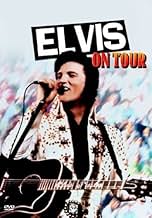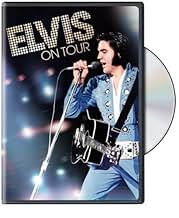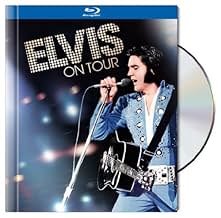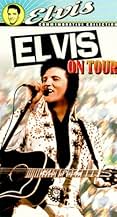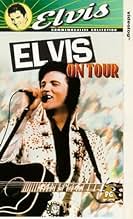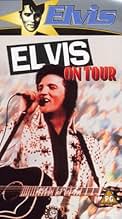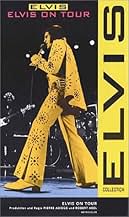IMDb-BEWERTUNG
7,5/10
1968
IHRE BEWERTUNG
Füge eine Handlung in deiner Sprache hinzuConcert footage and offstage documentary of singer Elvis Presley.Concert footage and offstage documentary of singer Elvis Presley.Concert footage and offstage documentary of singer Elvis Presley.
- Regie
- Drehbuch
- Hauptbesetzung
- Auszeichnungen
- 1 wins total
Estell Brown
- Self
- (as Estelle Brown)
Christopher Riordan
- Self
- (Archivfilmmaterial)
Empfohlene Bewertungen
As indicated by the title, the film is a documentary – edited by Martin Scorsese! – showing highlights of Elvis Presley touring the USA (with much use of the then-trendy split-screen technique); interesting in itself, this also served as the iconic singer’s cinematic swan-song. Of course, his inflated appearance by this time – a far cry from his lean early years, seen intermittently throughout via stock footage – is rather sad to witness but, at least, he seemed to be in good spirits.
We’re shown Elvis performing in front of several different hysterical audiences – at one point, even admitting to still getting stage fright before going on – but also get to see him relax with his backing musicians (generally by singing gospel songs). The musical numbers include very few of his hits (“Love Me Tender” and “Can’t Help Falling In Love”, while others like “That’s All Right”, “Mystery Train” and “Suspicious Minds” are only heard via original recordings) but there are two outstanding cover versions by The King of then-vintage rock classics – Creedence Clearwater Revival’s “Proud Mary” and Simon & Garfunkel’s “Bridge Over Troubled Water”!
The great final line of the film – “Elvis has left the building” – spoken by the compere (and which I suppose was uttered during most of his shows from this era) clearly attests to Presley’s legendary status even when he was still alive; this is followed by an inspired last shot of Elvis in pensive but evidently happy mood. Incidentally, the film won the Golden Globe Award as the year’s Best Documentary Feature – but, then, didn’t even make the list of nominees at the Oscars!
We’re shown Elvis performing in front of several different hysterical audiences – at one point, even admitting to still getting stage fright before going on – but also get to see him relax with his backing musicians (generally by singing gospel songs). The musical numbers include very few of his hits (“Love Me Tender” and “Can’t Help Falling In Love”, while others like “That’s All Right”, “Mystery Train” and “Suspicious Minds” are only heard via original recordings) but there are two outstanding cover versions by The King of then-vintage rock classics – Creedence Clearwater Revival’s “Proud Mary” and Simon & Garfunkel’s “Bridge Over Troubled Water”!
The great final line of the film – “Elvis has left the building” – spoken by the compere (and which I suppose was uttered during most of his shows from this era) clearly attests to Presley’s legendary status even when he was still alive; this is followed by an inspired last shot of Elvis in pensive but evidently happy mood. Incidentally, the film won the Golden Globe Award as the year’s Best Documentary Feature – but, then, didn’t even make the list of nominees at the Oscars!
If you're a fan of Elvis Presley like I am, then what's not to love about this thoroughly awesome documentary? It offers an excellent look at the King of Rock of Roll on tour exciting audiences as only he knew how. It's always very refreshing to see Elvis using his extraordinary talent and this film is no exception. A definite recommendation on my part.
Elvis had gotten chubby but he wasn't fat like he was when he died. Elvis still looks decent, and is in top vocal form. What "That's the Way It Is" did by showing Elvis's life in rehersal, this one did by showing Elvis's life on the road. It was good to see Elvis at or still near the peak of his performing career.
This is a multiple-screen documentary that provides an intimate and electrifying portrait of Elvis Presley. This was filmed during a 15-day tour that criss crossed the country. This dynamic glimpse of the legendary performer won the 1972 Golden Globe for Best Documentary. This is positive support proving Elvis being one of the world's most beloved entertainers. After viewing this film, even non-fans have trouble denying that Presley is the greatest American phenomenon of the 20th century.
I've never been a big fan of Elvis Presley, though I will admit he could certainly belt out a great song, and he also knew how to put on a good show in front of an audience. "Elvis on Tour" is without doubt a valuable rock and roll concert documentary, capturing what Elvis was like in a key part of his career. It shows that he still had considerable singing chops and magnetism.
But at the same time, something often seems to missing as he's singing, almost like he is just going through the motions. It may be because he was older, it may be because of the narcotics he was taking - I'm not sure why he isn't as energetic as he was just a few years earlier. The only portions of the documentary where he performs with genuine enthusiasm and energy is with a couple of gospel songs.
The behind-the-scenes portions of the documentary are also a bit of a letdown. We learn very little about Elvis, like what he's thinking about this entire tour, what he thinks about where he is in his career, and a number of other unanswered questions.
I will say, however, that the musical numbers in the movie are very well directed and edited; the split screen techniques bombard the viewer with a lot of information, giving the feeling of actually being at an Elvis concert. This does make up for Elvis' somewhat lack of the energy he had in the past, and push the movie up to being an okay viewing experience, though more for real Elvis fans than more casual appreciators like myself.
But at the same time, something often seems to missing as he's singing, almost like he is just going through the motions. It may be because he was older, it may be because of the narcotics he was taking - I'm not sure why he isn't as energetic as he was just a few years earlier. The only portions of the documentary where he performs with genuine enthusiasm and energy is with a couple of gospel songs.
The behind-the-scenes portions of the documentary are also a bit of a letdown. We learn very little about Elvis, like what he's thinking about this entire tour, what he thinks about where he is in his career, and a number of other unanswered questions.
I will say, however, that the musical numbers in the movie are very well directed and edited; the split screen techniques bombard the viewer with a lot of information, giving the feeling of actually being at an Elvis concert. This does make up for Elvis' somewhat lack of the energy he had in the past, and push the movie up to being an okay viewing experience, though more for real Elvis fans than more casual appreciators like myself.
Wusstest du schon
- WissenswertesMartin Scorsese was the montage supervisor for this documentary.
- Zitate
Elvis Presley: [introducing band members to audience] "... and the guy that gives me my water and my scarves and so forth, his name is Charlie Hodge."
- Alternative VersionenDue to music licensing issues, substitutions were made for the 2010 DVD/Blu-Ray release. The opening song, Johnny B. Goode is replaced with Don't be Cruel, while the Also Sprach Zarathustra (Theme from 2001 - Odyssee im Weltraum (1968)) opening bars have been replaced with a generic piece of music.
- VerbindungenEdited from Die wilden Weiber von Tennessee (1964)
- SoundtracksSee See Rider
Traditional, also credited to Ma Rainey
Arranged by Elvis Presley
Performed by Elvis Presley
Top-Auswahl
Melde dich zum Bewerten an und greife auf die Watchlist für personalisierte Empfehlungen zu.
- How long is Elvis on Tour?Powered by Alexa
Details
Box Office
- Budget
- 600.000 $ (geschätzt)
- Bruttoertrag in den USA und Kanada
- 587.818 $
- Weltweiter Bruttoertrag
- 587.818 $
- Laufzeit1 Stunde 33 Minuten
- Seitenverhältnis
- 2.35 : 1
Zu dieser Seite beitragen
Bearbeitung vorschlagen oder fehlenden Inhalt hinzufügen





